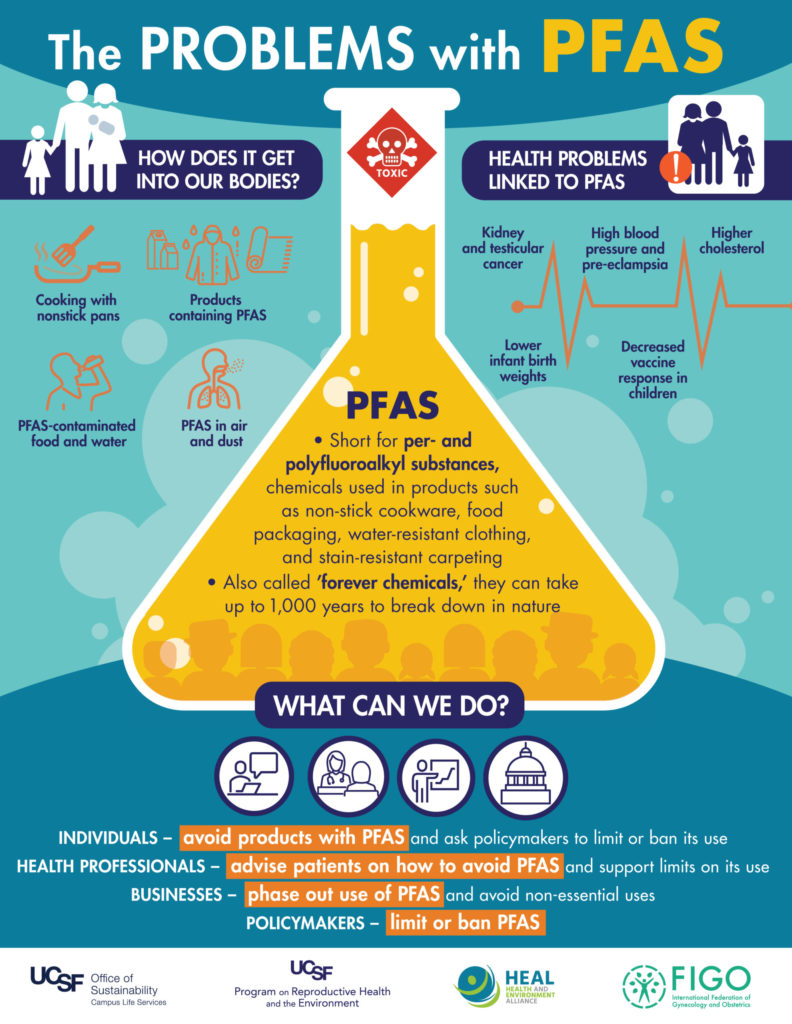Letter: The Scientific Consensus: PFAS In Synthetic Turf Is A Serious Public Health Hazard

Photo: env-health.org
The following letter was sent to the Amherst Town Council, Town Manager, Board of Health, and Water Supply Protection Committee on November 29, 2022.
Rumors swirl that the Town Council is planning to reconsider its vote to deny allocating funds to install a synthetic turf field at the high school. And I read this morning that Amherst Forward has charged that your prior vote to deny those funds was based on questionable data on health risks.
What is truly questionable is that the School Committee and the Town Council have suppressed a rigorous examination of the science of PFAS and synthetic turf. Because the scientific consensus is clear – PFAS in synthetic turf fields pose a well-documented public health hazard endangering the athletes who play on them and the communities that surround them. And each month, new studies emerge that further support that consensus. Those who have argued for the safety of the fields have not brought evidence to the discussion but rather aspirational anecdotes and the increasingly questionable claims of the manufacturers and the consultants who represent them. To move forward with a reconsideration before fully studying the public health consequences is reckless and irresponsible. I call on you to take the time to do this correctly and to base your decision on the facts and not on unsupportable claims that low levels of exposure pose no risk to our kids.
The island of Nantucket demonstrated last winter how a town does proper due diligence in such matters. They assembled a distinguished, expert panel of scientists to appear before town boards and committees (school committee, board of health, land council and water board) and they asked questions of those scientists and of Weston and Sampson, the proponents of synthetic turf. There was no speechifying or partisan statements or advocacy. Just good questions and detailed answers. Nantucket School Committee Chair Dr. Timothy Lepore stated – “we are here to learn” and that is what they did. Weston and Sampson reps insisted that the community had nothing to worry about and that low levels of PFAS coming off the fields posed no danger. The scientific consensus was that the risks were grave. And in the end, the School Committee voted to implement a one-year moratorium on their $17M field upgrades to further study the hazards of synthetic turf with the Land Council recommending outright against synthetic turf. I strongly recommend that you watch the entire hearing (link below). It’s eye opening. The scientific consensus was clear and alarming. Here’s a summary.
- PFAS are highly toxic to multiple organ systems and are implicated in several different cancers.
- Acceptable levels of exposure have not been established for humans and toxicologists agree that the risks of harmful exposure through contact, absorption, or inhalation are real.
- There is no such thing as safe levels of PFAS exposure
- There is no such thing as “PFAS free” synthetic turf. Even if “organic” infill is used, the pad and the grass blades contain and shed PFAS as well as considerable quantities of microplastics
- There is ALWAYS leaching of PFAS from synthetic fields into the surrounding soil and groundwater and even when that amount is small, the compounds are bio-accumulating “forever chemicals” and hence accumulate and pose a constant danger to all organisms
- When communities have had to install remediation for contamination, the costs generally have been borne wholly by the community, not the manufacturer. One example given at the Nantucket hearing was that of guaranteed “PFAS-free” fields in Easton, MA that are implicated in the contamination of two town wells and now require a $9.5M stormwater remediation system to address that contamination. Those costs will be borne exclusively by the taxpayers.
Our town did just the opposite of what Nantucket did. Instead of making a good faith effort to study and learn about the risks from PFAS the School Committee suppressed that information and the Town Council rushed a vote on the allocation for the fields before they could hear an assessment from the Board of Health that they themselves solicited.
A government that is not interested in learning or knowing – that only cherry picks facts or contrives arguments to support conclusions arrived at without rigorous study or deliberation is the antithesis of good and responsible government. It happens all too often here but there is too much at stake – the health of our kids and our neighborhoods – to let that happen this time.
Take the time to study the risks and get this right.
I offer some helpful links below to help you get started.
Art Keene
Art Keene is a resident of District 5 and the Managing Editor of the Amherst Indy. His four children are graduates of Amherst Regional High School. He was head coach of the ARHS girls cross country team for 17 years.
LINKS
The link to the Nantucket public hearing:
The link To the Amherst Indy article on the Nantucket hearing:
And here is a link to a letter (that also appeared as a commentary in the Martha’s Vineyard press) from torts Attorney James L. Ferraro to the Martha’s Vineyard School Committee, (now involved in litigation over synthetic turf), whose firm represents hundreds of PFAS complainants, warning that failure to consider the known health risks from PFAS offers no protection from legal liability.
https://www.fieldfundinc.org/letters-links/2020/7/1/ferraro-law-firm-legal-letter-to-mv-commission-and-oak-bluffs-planning-board
https://vineyardgazette.com/news/2016/12/08/artificial-turm-may-equal-real-litigation
